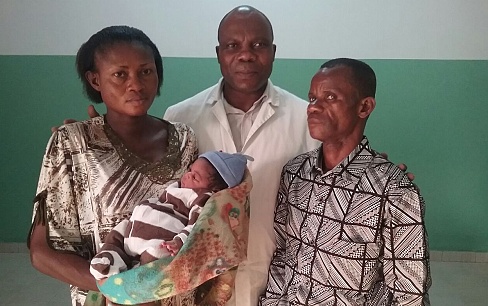
Aug 23, 2016 | Focolare Worldwide
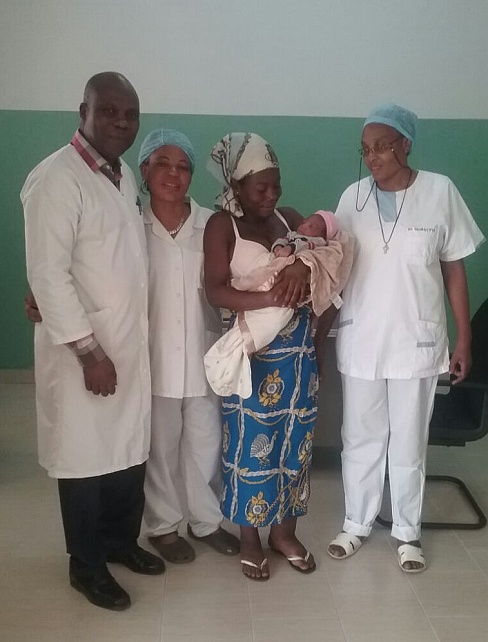 Taking two years to build, with costs that reached €409,559, the new maternity wing of the Medical Centre, “Moyimwa Ntongo” in the Congolese capital was inaugurated precisely on the Centre’s 10th anniversary. The first infant was born last 29 April! It is an essential service, considering that – as the Health Director, Arthur Ngoy affirmed – the mortality rate of infants and mothers in Congo are still very high:”846 maternal deaths over every 100,000 live births” – while the world average is 216 – “and 104 out of 1,000 are the deaths of infants”, one of the highest rates worldwide. “The new department was built through the efforts of several people and agencies related to the Focolare Movement such as the Giancarlo Pallavicini Foundation; Albina Gianotti and Victorina Giussani who have been sponsors of the Medical Centre since the beginning; AMU-Luxembourg and AECOM Congo along with their supporters; many people in Luxembourg, including children who have made and sold small knick-knacks and done odd jobs to earn some money even in winter.” “This medical centre gives us the opportunity to respond concretely to the invitation of the Church in the document, AfricaeMunus (n.140), that urges all the healthcare institutions of the Church and all the people working in these organisations in the most varied roles, to try to see in every patient,a suffering member of the Body of Christ,” affirmed Damien Kasereka, co-director with Ghislaine Kahambu, of the Focolare Movement in Congo.
Taking two years to build, with costs that reached €409,559, the new maternity wing of the Medical Centre, “Moyimwa Ntongo” in the Congolese capital was inaugurated precisely on the Centre’s 10th anniversary. The first infant was born last 29 April! It is an essential service, considering that – as the Health Director, Arthur Ngoy affirmed – the mortality rate of infants and mothers in Congo are still very high:”846 maternal deaths over every 100,000 live births” – while the world average is 216 – “and 104 out of 1,000 are the deaths of infants”, one of the highest rates worldwide. “The new department was built through the efforts of several people and agencies related to the Focolare Movement such as the Giancarlo Pallavicini Foundation; Albina Gianotti and Victorina Giussani who have been sponsors of the Medical Centre since the beginning; AMU-Luxembourg and AECOM Congo along with their supporters; many people in Luxembourg, including children who have made and sold small knick-knacks and done odd jobs to earn some money even in winter.” “This medical centre gives us the opportunity to respond concretely to the invitation of the Church in the document, AfricaeMunus (n.140), that urges all the healthcare institutions of the Church and all the people working in these organisations in the most varied roles, to try to see in every patient,a suffering member of the Body of Christ,” affirmed Damien Kasereka, co-director with Ghislaine Kahambu, of the Focolare Movement in Congo.  “It is a huge satisfaction, “Dr Ngoy commented, “especially for the mothers who had to be transferred to another facility to give birth, after nine months of prenatal checkups in our centre.They felt they were being abandoned just when they most needed us.But it is also because we can respond to the Congolese government’s request to offer complete, continuous and quality treatments. This is why we thank Chiara Lubich who established this centre.” At the inauguration last 9 July,together with the medical team, patients, civil and religious authorities, architect and his team, and journalists, there was also a small delegation from AMU Luxembourg. The thanksgiving mass was celebrated by the auxiliary bishop of Kinshasa, Bishop Bodika, while the ribbon was cut by the Health Minister, Vital Kabuiku, together with the Apostolic Nuncio, Luis Mariano Montemayor, and the auxiliary bishop.
“It is a huge satisfaction, “Dr Ngoy commented, “especially for the mothers who had to be transferred to another facility to give birth, after nine months of prenatal checkups in our centre.They felt they were being abandoned just when they most needed us.But it is also because we can respond to the Congolese government’s request to offer complete, continuous and quality treatments. This is why we thank Chiara Lubich who established this centre.” At the inauguration last 9 July,together with the medical team, patients, civil and religious authorities, architect and his team, and journalists, there was also a small delegation from AMU Luxembourg. The thanksgiving mass was celebrated by the auxiliary bishop of Kinshasa, Bishop Bodika, while the ribbon was cut by the Health Minister, Vital Kabuiku, together with the Apostolic Nuncio, Luis Mariano Montemayor, and the auxiliary bishop.
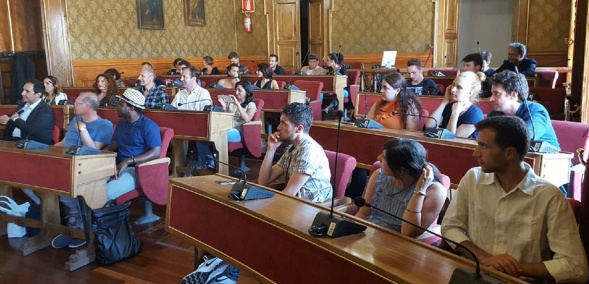
Aug 22, 2016 | Focolare Worldwide
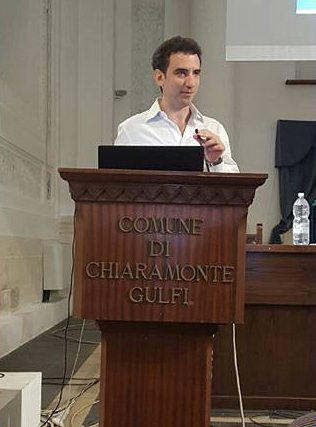 “We live in a world where anxiety and fear are inwardly and also physically destroying us. Let’s try together to bring about a rebirth of goodness and constructive relationships in the pursuit of the common good. I know we’re only like a small drop in the ocean, but just think of a drop of dye when it’s added to a bit of water: the water moves towards the colour of the dye.” This is how Manfred, who attended the Summer School, summarized the event that was organized by Communion and Law in Chiaramonte Gulfi, Italy. Thirty young people from Nigeria, Spain, Germany, Holland and Italy met to discuss: “Law in Europe: Welcome and Rejection: Immigration, Security and Environment”. The final report, which was framed by the university professors and young people themselves, highlighted the deep connection between the lack of protection of the environment that is sometimes the result of “invisible wars” and many armed conflicts – and the subsequent immigrations. Apollos, a Nigerian refugee, brought us into the dramatic experience of being refugees, helping us to make our own their expectations for justice and finding hope for them. The FO.CO. Cooperative that operates in Chiaramonte Gulfi and in other Sicilian cities is one of those roads of hope. Its goal is to obtain diplomas and jobs for refugees, and help them integrate into society. The Chiaramonte experience is bearing fruits in peaceful lives. The dialogue with public institutions was also important. We were received in the Council Chamber of the City of Ragusa where the president of the City Council and some councillors took part in an open discussion with us about the situation of the environment, recycling and citizen involvement in public institutions.
“We live in a world where anxiety and fear are inwardly and also physically destroying us. Let’s try together to bring about a rebirth of goodness and constructive relationships in the pursuit of the common good. I know we’re only like a small drop in the ocean, but just think of a drop of dye when it’s added to a bit of water: the water moves towards the colour of the dye.” This is how Manfred, who attended the Summer School, summarized the event that was organized by Communion and Law in Chiaramonte Gulfi, Italy. Thirty young people from Nigeria, Spain, Germany, Holland and Italy met to discuss: “Law in Europe: Welcome and Rejection: Immigration, Security and Environment”. The final report, which was framed by the university professors and young people themselves, highlighted the deep connection between the lack of protection of the environment that is sometimes the result of “invisible wars” and many armed conflicts – and the subsequent immigrations. Apollos, a Nigerian refugee, brought us into the dramatic experience of being refugees, helping us to make our own their expectations for justice and finding hope for them. The FO.CO. Cooperative that operates in Chiaramonte Gulfi and in other Sicilian cities is one of those roads of hope. Its goal is to obtain diplomas and jobs for refugees, and help them integrate into society. The Chiaramonte experience is bearing fruits in peaceful lives. The dialogue with public institutions was also important. We were received in the Council Chamber of the City of Ragusa where the president of the City Council and some councillors took part in an open discussion with us about the situation of the environment, recycling and citizen involvement in public institutions.  We were struck to hear Pope Francis speak at the WYD about the same topics that we were discussing: the war in Nigeria, the struggle for natural resources; the walls of fear, the need of a new culture, the courage to build bridges beyond our differences and relationships that are respectful of the dignity of every human being. Our own diversity was enriching: not all of us at the school were legal experts, and this allowed for an open and not exclusively technical discussion that was more accessible to the young people. One philosophy teacher remarked: “I think this summer school is a good synthesis, the way it constantly connects theory with daily life. This synergy seems very important in my opinion: theory is useful, but then it needs to be married to daily living.” Christian, the young lawyer and Deputy Mayor whose efforts had largely led to the success of the Summer School, concluded by saying: “It was possible to hold the school here, thanks to the work and precious contribution of many people, and it is something that should continue. It was an experience that went beyond every rosy forecast and that has left a mark: ‘seeds’ of a new culture. This opportunity to meet with other young lawyers was a moving professional experience for me. Their serenity, their sense of duty…. In such a fast-moving world, this is the real challenge: to share ourselves with others.”
We were struck to hear Pope Francis speak at the WYD about the same topics that we were discussing: the war in Nigeria, the struggle for natural resources; the walls of fear, the need of a new culture, the courage to build bridges beyond our differences and relationships that are respectful of the dignity of every human being. Our own diversity was enriching: not all of us at the school were legal experts, and this allowed for an open and not exclusively technical discussion that was more accessible to the young people. One philosophy teacher remarked: “I think this summer school is a good synthesis, the way it constantly connects theory with daily life. This synergy seems very important in my opinion: theory is useful, but then it needs to be married to daily living.” Christian, the young lawyer and Deputy Mayor whose efforts had largely led to the success of the Summer School, concluded by saying: “It was possible to hold the school here, thanks to the work and precious contribution of many people, and it is something that should continue. It was an experience that went beyond every rosy forecast and that has left a mark: ‘seeds’ of a new culture. This opportunity to meet with other young lawyers was a moving professional experience for me. Their serenity, their sense of duty…. In such a fast-moving world, this is the real challenge: to share ourselves with others.”

Aug 20, 2016 | Focolare Worldwide, Senza categoria
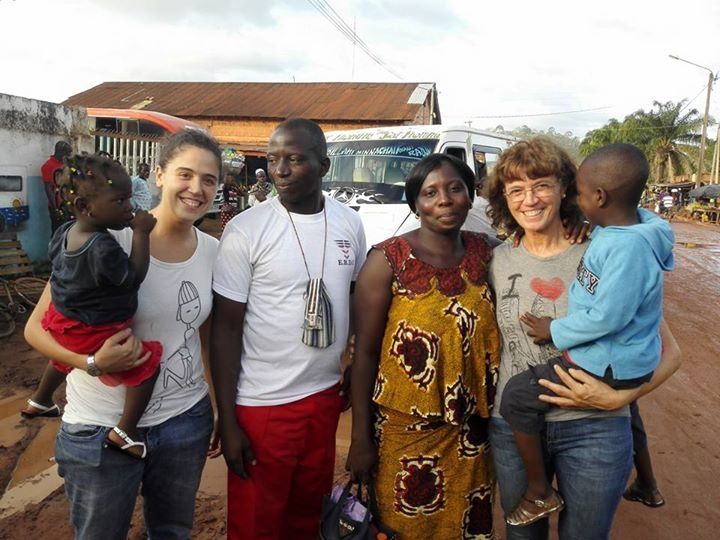 At the beginning of July, at the “Villaggio del Ragazzo” (Teens’ Village) of San Salvatore di Cogorno (Province of Genoa), the “Premio Bontà Don Nando Negri 2016” (Goodness Prize 2016 Fr Nando Negri) was awarded to Veronica Podestà, a young Italian nurse who works at the Benedetto Acquarone Centre in the town of Chiavari, Liguria. Out of her commitment, her enthusiasm, and her tenacity, Veronica could give to Daniel (a boy from Ivory Coast suffering from Tetralogy of Fallot (TOF) congenital heart defect, the opportunity to undergo a surgical operation at the Hospital of Massa, in Northern Italy. Veronica lives in Graveglia di Carasco, a little town of Eastern Liguria overlooking the Entella stream: “Since I have started studying,” she says, “I had a dream: to put my professional competence at the service of others. In 2013, when I had just graduated, I immediately wanted to leave for Africa. Thanks to the advice of a friend, I realized there was a chance to go to Man, Ivory Coast. At first I was supposed to stay only three months, but once there, the months of my staying multiplied! At first it was hard because I did not speak French. Yet, I found out that the universal language is that of Love. Concrete gestures build bridges much more than words.” Veronica goes on sharing and it becomes clear that it was an incredible experience. “At some point, with some girls we decided to organize a small business to sell some items. For several months, after work, we met to craft necklaces, bracelets, etc., and to collect all superfluous items in our homes. The proceeds were put into a common fund to be used in the event of economic problems, or to finance someone’s studies, and so on … One day, one of the girls shared a major difficulty: her father had not received his salary and her family had nothing to eat. All of us agreed to allocate part of the common fund to help her family. I saw a Gospel which was put into practice, and not just contemplated !”.
At the beginning of July, at the “Villaggio del Ragazzo” (Teens’ Village) of San Salvatore di Cogorno (Province of Genoa), the “Premio Bontà Don Nando Negri 2016” (Goodness Prize 2016 Fr Nando Negri) was awarded to Veronica Podestà, a young Italian nurse who works at the Benedetto Acquarone Centre in the town of Chiavari, Liguria. Out of her commitment, her enthusiasm, and her tenacity, Veronica could give to Daniel (a boy from Ivory Coast suffering from Tetralogy of Fallot (TOF) congenital heart defect, the opportunity to undergo a surgical operation at the Hospital of Massa, in Northern Italy. Veronica lives in Graveglia di Carasco, a little town of Eastern Liguria overlooking the Entella stream: “Since I have started studying,” she says, “I had a dream: to put my professional competence at the service of others. In 2013, when I had just graduated, I immediately wanted to leave for Africa. Thanks to the advice of a friend, I realized there was a chance to go to Man, Ivory Coast. At first I was supposed to stay only three months, but once there, the months of my staying multiplied! At first it was hard because I did not speak French. Yet, I found out that the universal language is that of Love. Concrete gestures build bridges much more than words.” Veronica goes on sharing and it becomes clear that it was an incredible experience. “At some point, with some girls we decided to organize a small business to sell some items. For several months, after work, we met to craft necklaces, bracelets, etc., and to collect all superfluous items in our homes. The proceeds were put into a common fund to be used in the event of economic problems, or to finance someone’s studies, and so on … One day, one of the girls shared a major difficulty: her father had not received his salary and her family had nothing to eat. All of us agreed to allocate part of the common fund to help her family. I saw a Gospel which was put into practice, and not just contemplated !”.  It was not always easy: “Sometimes I missed my family, my friends, my habits … but the sky remained always my best friend. When I felt alone, or I had a pain that I could not overcome, I looked up and, looking at the sky, I got lost into the immensity of creation. How much harmony, how much love in everything that was around me … and that Love was for me too!“. And she continues her story: “During my experience in Africa I got to know a boy who had a heart defect at birth. Every time he came, Daniel illuminated our dispensary with a gorgeous smile. Although he had to undergo invasive treatments, the love and joy he emanated were diffusive and contagious. Despite our great efforts, there was a long way to go. He needed more care and more appropriate interventions ….” After a year, Veronica’s experience is over and, upon returning home, she found a surprise: “When I got home, I found all my friends waiting for me in the garden for a surprise party. I was excited and so happy to meet all the people I loved so much. But inside I could not forget about Daniel’s smile when I said goodbye to him. I could not leave him alone … With some friends, then, we set out to see if it was possible having him operated in Italy.” Veronica’s enthusiasm is contagious. After a few weeks, together with her family and friends she organized a fund-raising dinner to allow Daniel to come to Italy for the operation. A month later, Daniel arrived in Italy accompanied by his father and Carlo (a focolarino who had been helping them with all the paperwork). “Two very intense months followed. Thanks to Daniel’s smiles, our respective cultures got enriched and we rediscovered them. Through his eyes I rediscovered the sea, the snow, and the joy of living the present moment.” Meanwhile, Daniel had been successfully operated. His dad had promised him a bicycle if everything would be fine. After the operation, however, he realizes that it was an expensive gift for them to afford… Yet, the love of the community had immediate effects: “Precisely the same night in which Daniel’s father confided to me his difficulty, a friend of mine brings me an envelope. At her birthday party she had presented the story of Daniel. Her friends, instead of gifts, had collected the money just for him. And, incredibly, the envelope contained exactly the sum which was needed to buy the bicycle that Daniel desired so much!” It’s time to say goodbye. We ask Veronica what she learned from this experience. She replies with a wonderful smile, “I had left Italy with the conviction that I had so much to give. And instead, I realized that, every day, I received a lot more than I gave… Often we start with the idea of changing the world; but we realize that in order to do so, we must begin by changing ourselves and our way of being with others. Only by building, moment by moment, bridges of brotherhood we can change the world and enlighten it with many smiles.” Just like Daniel’s smile.
It was not always easy: “Sometimes I missed my family, my friends, my habits … but the sky remained always my best friend. When I felt alone, or I had a pain that I could not overcome, I looked up and, looking at the sky, I got lost into the immensity of creation. How much harmony, how much love in everything that was around me … and that Love was for me too!“. And she continues her story: “During my experience in Africa I got to know a boy who had a heart defect at birth. Every time he came, Daniel illuminated our dispensary with a gorgeous smile. Although he had to undergo invasive treatments, the love and joy he emanated were diffusive and contagious. Despite our great efforts, there was a long way to go. He needed more care and more appropriate interventions ….” After a year, Veronica’s experience is over and, upon returning home, she found a surprise: “When I got home, I found all my friends waiting for me in the garden for a surprise party. I was excited and so happy to meet all the people I loved so much. But inside I could not forget about Daniel’s smile when I said goodbye to him. I could not leave him alone … With some friends, then, we set out to see if it was possible having him operated in Italy.” Veronica’s enthusiasm is contagious. After a few weeks, together with her family and friends she organized a fund-raising dinner to allow Daniel to come to Italy for the operation. A month later, Daniel arrived in Italy accompanied by his father and Carlo (a focolarino who had been helping them with all the paperwork). “Two very intense months followed. Thanks to Daniel’s smiles, our respective cultures got enriched and we rediscovered them. Through his eyes I rediscovered the sea, the snow, and the joy of living the present moment.” Meanwhile, Daniel had been successfully operated. His dad had promised him a bicycle if everything would be fine. After the operation, however, he realizes that it was an expensive gift for them to afford… Yet, the love of the community had immediate effects: “Precisely the same night in which Daniel’s father confided to me his difficulty, a friend of mine brings me an envelope. At her birthday party she had presented the story of Daniel. Her friends, instead of gifts, had collected the money just for him. And, incredibly, the envelope contained exactly the sum which was needed to buy the bicycle that Daniel desired so much!” It’s time to say goodbye. We ask Veronica what she learned from this experience. She replies with a wonderful smile, “I had left Italy with the conviction that I had so much to give. And instead, I realized that, every day, I received a lot more than I gave… Often we start with the idea of changing the world; but we realize that in order to do so, we must begin by changing ourselves and our way of being with others. Only by building, moment by moment, bridges of brotherhood we can change the world and enlighten it with many smiles.” Just like Daniel’s smile.
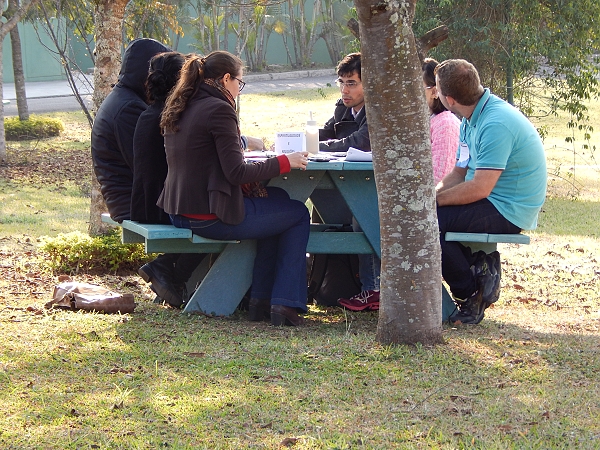
Aug 19, 2016 | Focolare Worldwide
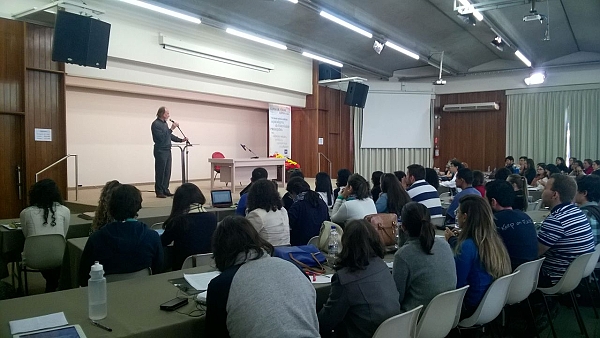 “I was totally demotivated in my profession as an engineer…Now I have rediscovered its importance in another light…” “I am in my second year in architecture. The university presents it in a very commercial light, where the human aspect is missing. This course has exceeded my expectations.” These were just two of the many impressions expressed by the 80 Latin-American university students at the end of the intense week of the course (25-30July), at the Mariapolis Ginetta Congress Centre close to Sao Paulo, Brazil. This cultural initiative promoted by the Sophia Latin-American Academic Centre (ALC) of the Focolare Movement, was an innovative project, well expressed by its title: “The theoretical-practical fundaments of the paradigm of fraternity, projected in the social, political, economic and cultural sciences.”
“I was totally demotivated in my profession as an engineer…Now I have rediscovered its importance in another light…” “I am in my second year in architecture. The university presents it in a very commercial light, where the human aspect is missing. This course has exceeded my expectations.” These were just two of the many impressions expressed by the 80 Latin-American university students at the end of the intense week of the course (25-30July), at the Mariapolis Ginetta Congress Centre close to Sao Paulo, Brazil. This cultural initiative promoted by the Sophia Latin-American Academic Centre (ALC) of the Focolare Movement, was an innovative project, well expressed by its title: “The theoretical-practical fundaments of the paradigm of fraternity, projected in the social, political, economic and cultural sciences.” 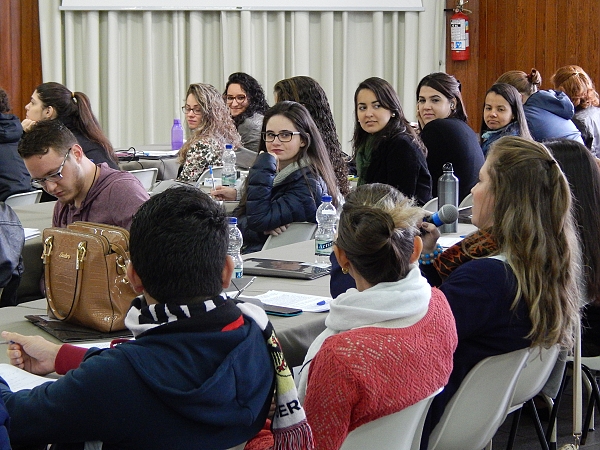 The Latin-American youths penetrated deeply into the wounds that still afflict their peoples: the socio-economic crisis, drama of the indigenous populations, and great issues of the Amazon, the social inequality and violence, of which,” as the Argentine political expert, Juan Esteban Belderrain, commented, “Latin America holds the said world title. In 2012 the number of homicides rose to over 140,000, one third of the world index and over 50,000 in Brazil alone. This sad phenomenon is on the rise. Against this dramatic background the course members delved into the cultural novelty introduced into their own disciplines, to imbue thoughts and lifestyles with the concrete activation of the paradigm of fraternity. For example, as explained by the Brazilian professor, Marconi Aurélio, and Political Sciences professor, Silva, with the application of this paradigm already practised for 20 years, politics overcomes the conflicting dimension, majorities and oppositions are viewed as complementary, part of the truth can also be gathered from opponents, and the participation of citizens is activated.
The Latin-American youths penetrated deeply into the wounds that still afflict their peoples: the socio-economic crisis, drama of the indigenous populations, and great issues of the Amazon, the social inequality and violence, of which,” as the Argentine political expert, Juan Esteban Belderrain, commented, “Latin America holds the said world title. In 2012 the number of homicides rose to over 140,000, one third of the world index and over 50,000 in Brazil alone. This sad phenomenon is on the rise. Against this dramatic background the course members delved into the cultural novelty introduced into their own disciplines, to imbue thoughts and lifestyles with the concrete activation of the paradigm of fraternity. For example, as explained by the Brazilian professor, Marconi Aurélio, and Political Sciences professor, Silva, with the application of this paradigm already practised for 20 years, politics overcomes the conflicting dimension, majorities and oppositions are viewed as complementary, part of the truth can also be gathered from opponents, and the participation of citizens is activated.  This new cultural paradigm was also put into practice in the interpersonal relationships between students and professors of various Latin-American cultures, in an interdisciplinary and multicultural dimension. But there is even more. Starting from the youth who undertook to identify the greater urgencies of their cities and with the support of the professors, projects covering the political, economic and social aspects were laid out and implemented. In conclusion, Prof. Sergio Rondinara of the Sophia University Institute (Italy) of which Sophia ALC is the first extra-European section, expressed great hope in his welcoming speech, and said that this reality gives “a beautiful, crystal-clear view of the future of this continent which has extraordinary potentials.”
This new cultural paradigm was also put into practice in the interpersonal relationships between students and professors of various Latin-American cultures, in an interdisciplinary and multicultural dimension. But there is even more. Starting from the youth who undertook to identify the greater urgencies of their cities and with the support of the professors, projects covering the political, economic and social aspects were laid out and implemented. In conclusion, Prof. Sergio Rondinara of the Sophia University Institute (Italy) of which Sophia ALC is the first extra-European section, expressed great hope in his welcoming speech, and said that this reality gives “a beautiful, crystal-clear view of the future of this continent which has extraordinary potentials.”
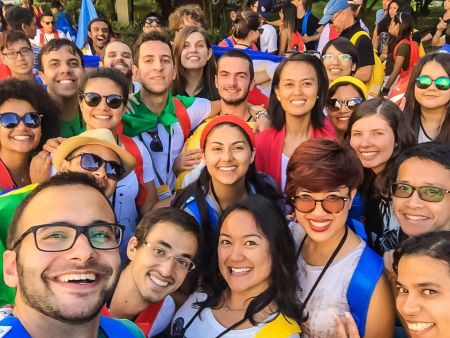
Aug 18, 2016 | Focolare Worldwide
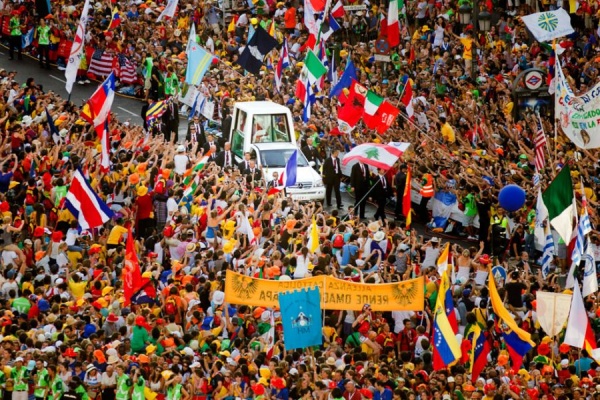 There was much enthusiasm, a desire to know more and to be protagonists of their future at Jasna, Slovakia on August 1-6. “We could never have dreamed that it would be like this. If we refuse to content ourselves with just being comfortable, if we are not couch potatoe Christians, then we will really be able to be protagonists of history,” said young Annita from Argentina when it was time to leave. “The courageous proposals that were offered by Pope Francis at WYD called for an immediate response, but also an understanding that would develop over time and that’s what we tried to do here at Jasna,” explained philosopher Gianluca Falconi. Along with theologian Michel Vandeleene and psychologist Antonella Deponte they offered a multi-disciplinary approach to the Pope’s proposals and how they could be implemented. Francesco from Krakow talked about fighting the fear of spreading peace in a world so filled with hatred. He talked about the value of mercy and of the Cross, of the obstacles that have to be overcome in order to encounter Jesus. But how could these challenges be translated concretely into daily life? The days together in Slovakia offered an opportunity to go into details, to examine the reasons behind things, to ask questions about one’s own life. The internationality of the group provided the possibility of a comparison with other parts of the world: from Lebanon to Australia, from France to the United States, from Russia to Ukraine. The organizers explain that “One of the strongest topics had nothing to do with the existence of God or the big questions of life, but the relationship with the other, the relationship with diversity. These were the themes around which the discussion developed. What came out were issues of a more personal kind, the innate value of each one of us, the chances and the difficulties that relationships with an other can represent, with an enemy, with someone who thinks differently.”
There was much enthusiasm, a desire to know more and to be protagonists of their future at Jasna, Slovakia on August 1-6. “We could never have dreamed that it would be like this. If we refuse to content ourselves with just being comfortable, if we are not couch potatoe Christians, then we will really be able to be protagonists of history,” said young Annita from Argentina when it was time to leave. “The courageous proposals that were offered by Pope Francis at WYD called for an immediate response, but also an understanding that would develop over time and that’s what we tried to do here at Jasna,” explained philosopher Gianluca Falconi. Along with theologian Michel Vandeleene and psychologist Antonella Deponte they offered a multi-disciplinary approach to the Pope’s proposals and how they could be implemented. Francesco from Krakow talked about fighting the fear of spreading peace in a world so filled with hatred. He talked about the value of mercy and of the Cross, of the obstacles that have to be overcome in order to encounter Jesus. But how could these challenges be translated concretely into daily life? The days together in Slovakia offered an opportunity to go into details, to examine the reasons behind things, to ask questions about one’s own life. The internationality of the group provided the possibility of a comparison with other parts of the world: from Lebanon to Australia, from France to the United States, from Russia to Ukraine. The organizers explain that “One of the strongest topics had nothing to do with the existence of God or the big questions of life, but the relationship with the other, the relationship with diversity. These were the themes around which the discussion developed. What came out were issues of a more personal kind, the innate value of each one of us, the chances and the difficulties that relationships with an other can represent, with an enemy, with someone who thinks differently.”  All the questions were based on personal experiences, like that of a young man from Iraq who highlighted the difficulties he is facing in relating to people from his own country. For some, a move in the direction of “the other” proved impossible. Therefore, smaller discussion groups were formed and also opportunities for personal conversations that were more spiritual, psychological or sociological. There were also discussions about the relationship with oneself, autonomy, personal dignity, feelings and open-mindedness. Another topic was the future: choosing a direction for one’s own life. This topic was discussed in a mixed group made up of teenagers, university students and workers, Christians from different Churches, agnostics, non-believers. They spoke in 13 languages and came from a variety of backgrounds, quite a diverse crowd, but alike in their thirst for truth. “It’s not the usual way young people present themselves in today’s society,” commented Gianluca who has had long experience in the field of education. Carla, an Italian remarked: “I’m 15 years old and there were people over thirty in my group. It’s beautiful because I had something to compare myself with, to ask for further explaining and feel assured.” It was an interweaving of generations, languages and cultures: “Philosophy isn’t very appreciated in my own country, because the approach to reality is different,” explained Antoine from Lebanon. “But I’m glad to be able to know other ways of thinking that are different from mine.” The young people take home with them an experience of fraternity that is the antidote to evil. Anna from Milan admits: “The Pope told us to never stop dreaming, and what we’re living now is a dream come true.”
All the questions were based on personal experiences, like that of a young man from Iraq who highlighted the difficulties he is facing in relating to people from his own country. For some, a move in the direction of “the other” proved impossible. Therefore, smaller discussion groups were formed and also opportunities for personal conversations that were more spiritual, psychological or sociological. There were also discussions about the relationship with oneself, autonomy, personal dignity, feelings and open-mindedness. Another topic was the future: choosing a direction for one’s own life. This topic was discussed in a mixed group made up of teenagers, university students and workers, Christians from different Churches, agnostics, non-believers. They spoke in 13 languages and came from a variety of backgrounds, quite a diverse crowd, but alike in their thirst for truth. “It’s not the usual way young people present themselves in today’s society,” commented Gianluca who has had long experience in the field of education. Carla, an Italian remarked: “I’m 15 years old and there were people over thirty in my group. It’s beautiful because I had something to compare myself with, to ask for further explaining and feel assured.” It was an interweaving of generations, languages and cultures: “Philosophy isn’t very appreciated in my own country, because the approach to reality is different,” explained Antoine from Lebanon. “But I’m glad to be able to know other ways of thinking that are different from mine.” The young people take home with them an experience of fraternity that is the antidote to evil. Anna from Milan admits: “The Pope told us to never stop dreaming, and what we’re living now is a dream come true.”
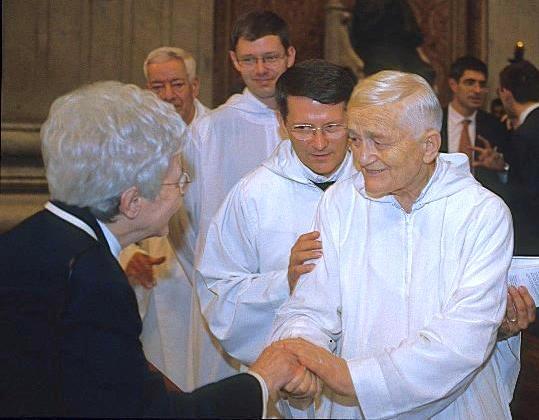
Aug 17, 2016 | Focolare Worldwide
 «Shocked by the news of the sudden death of our dear Frère Roger Schutz, we join the entire Community of Taize in this moment of prayer and deep pain. He had committed his whole life to God and his brethren, and has been crowned with the palm of martyrdom. Frère Roger was a constructor of peace, and a prophet of hope and joy. “God wants us to be happy,“ he had written to me about two months ago, and now we think of him in the fullness of joy in the heart of the Trinity. We are particularly close to you in this situation. We hope that the deep 40-year friendship with Frère Roger and the Community of Taizé, will continue even now that he has gone to Heaven.» Chiara Lubich So also today, we wish to remember him as a builder of peace, and a prophet of hope and joy.
«Shocked by the news of the sudden death of our dear Frère Roger Schutz, we join the entire Community of Taize in this moment of prayer and deep pain. He had committed his whole life to God and his brethren, and has been crowned with the palm of martyrdom. Frère Roger was a constructor of peace, and a prophet of hope and joy. “God wants us to be happy,“ he had written to me about two months ago, and now we think of him in the fullness of joy in the heart of the Trinity. We are particularly close to you in this situation. We hope that the deep 40-year friendship with Frère Roger and the Community of Taizé, will continue even now that he has gone to Heaven.» Chiara Lubich So also today, we wish to remember him as a builder of peace, and a prophet of hope and joy.

 Taking two years to build, with costs that reached €409,559, the new maternity wing of the Medical Centre, “Moyimwa Ntongo” in the Congolese capital was inaugurated precisely on the Centre’s 10th anniversary. The first infant was born last 29 April! It is an essential service, considering that – as the Health Director, Arthur Ngoy affirmed – the mortality rate of infants and mothers in Congo are still very high:”846 maternal deaths over every 100,000 live births” – while the world average is 216 – “and 104 out of 1,000 are the deaths of infants”, one of the highest rates worldwide. “The new department was built through the efforts of several people and agencies related to the Focolare Movement such as the Giancarlo Pallavicini Foundation; Albina Gianotti and Victorina Giussani who have been sponsors of the Medical Centre since the beginning; AMU-Luxembourg and AECOM Congo along with their supporters; many people in Luxembourg, including children who have made and sold small knick-knacks and done odd jobs to earn some money even in winter.” “This medical centre gives us the opportunity to respond concretely to the invitation of the Church in the document, AfricaeMunus (n.140), that urges all the healthcare institutions of the Church and all the people working in these organisations in the most varied roles, to try to see in every patient,a suffering member of the Body of Christ,” affirmed Damien Kasereka, co-director with Ghislaine Kahambu, of the Focolare Movement in Congo.
Taking two years to build, with costs that reached €409,559, the new maternity wing of the Medical Centre, “Moyimwa Ntongo” in the Congolese capital was inaugurated precisely on the Centre’s 10th anniversary. The first infant was born last 29 April! It is an essential service, considering that – as the Health Director, Arthur Ngoy affirmed – the mortality rate of infants and mothers in Congo are still very high:”846 maternal deaths over every 100,000 live births” – while the world average is 216 – “and 104 out of 1,000 are the deaths of infants”, one of the highest rates worldwide. “The new department was built through the efforts of several people and agencies related to the Focolare Movement such as the Giancarlo Pallavicini Foundation; Albina Gianotti and Victorina Giussani who have been sponsors of the Medical Centre since the beginning; AMU-Luxembourg and AECOM Congo along with their supporters; many people in Luxembourg, including children who have made and sold small knick-knacks and done odd jobs to earn some money even in winter.” “This medical centre gives us the opportunity to respond concretely to the invitation of the Church in the document, AfricaeMunus (n.140), that urges all the healthcare institutions of the Church and all the people working in these organisations in the most varied roles, to try to see in every patient,a suffering member of the Body of Christ,” affirmed Damien Kasereka, co-director with Ghislaine Kahambu, of the Focolare Movement in Congo.  “It is a huge satisfaction, “Dr Ngoy commented, “especially for the mothers who had to be transferred to another facility to give birth, after nine months of prenatal checkups in our centre.They felt they were being abandoned just when they most needed us.But it is also because we can respond to the Congolese government’s request to offer complete, continuous and quality treatments. This is why we thank Chiara Lubich who established this centre.” At the inauguration last 9 July,together with the medical team, patients, civil and religious authorities, architect and his team, and journalists, there was also a small delegation from AMU Luxembourg. The thanksgiving mass was celebrated by the auxiliary bishop of Kinshasa, Bishop Bodika, while the ribbon was cut by the Health Minister, Vital Kabuiku, together with the Apostolic Nuncio, Luis Mariano Montemayor, and the auxiliary bishop.
“It is a huge satisfaction, “Dr Ngoy commented, “especially for the mothers who had to be transferred to another facility to give birth, after nine months of prenatal checkups in our centre.They felt they were being abandoned just when they most needed us.But it is also because we can respond to the Congolese government’s request to offer complete, continuous and quality treatments. This is why we thank Chiara Lubich who established this centre.” At the inauguration last 9 July,together with the medical team, patients, civil and religious authorities, architect and his team, and journalists, there was also a small delegation from AMU Luxembourg. The thanksgiving mass was celebrated by the auxiliary bishop of Kinshasa, Bishop Bodika, while the ribbon was cut by the Health Minister, Vital Kabuiku, together with the Apostolic Nuncio, Luis Mariano Montemayor, and the auxiliary bishop.

 “We live in a world where anxiety and fear are inwardly and also physically destroying us. Let’s try together to bring about a rebirth of goodness and constructive relationships in the pursuit of the common good. I know we’re only like a small drop in the ocean, but just think of a drop of dye when it’s added to a bit of water: the water moves towards the colour of the dye.” This is how Manfred, who attended the Summer School, summarized the event that was organized by
“We live in a world where anxiety and fear are inwardly and also physically destroying us. Let’s try together to bring about a rebirth of goodness and constructive relationships in the pursuit of the common good. I know we’re only like a small drop in the ocean, but just think of a drop of dye when it’s added to a bit of water: the water moves towards the colour of the dye.” This is how Manfred, who attended the Summer School, summarized the event that was organized by 






